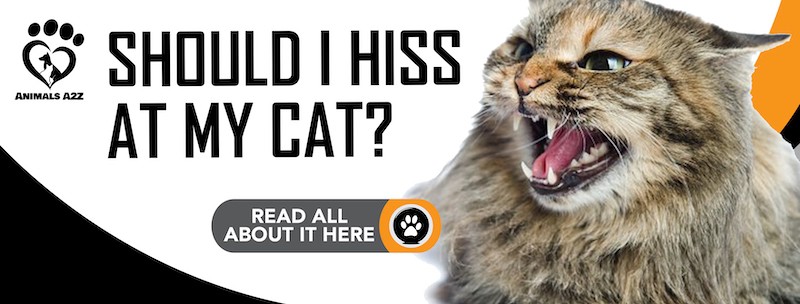Being cat owners, or more accurately, being owned by cats, we’ve all seen cats hissing. May it be at other animals or even us when they’re not in the cheeriest of moods. We’ve come to think of cats hissing as their way of telling us that they’re annoyed, pissed, or even threatened by something.
Table of Contents
Communicating with our cat with a hiss
As cat guardians, we always want to develop better relationships with our furry companions. Relationships are built on great communication. When our cat annoys us, should we in turn hiss at our cats? Will that be something they will understand or will we just look a bit loony doing it?
Is it OK if I hiss at my cat?
It is probably OK to hiss at your cat, but most likely it’s not really benefiting any parts. No studies give answers to if you should hiss at your cat or not. We do recommend that you don’t hiss at your cat. Try other communication methods.
What about the meow: Why do kittens meow back at you when you talk to them.
Why do cats hiss?
There’s a bunch of different reasons as to why cats hiss. The most well-known reason as to why cats make these snake-like sounds is to warn others that they are not comfortable with the situation they are in and will attack when provoked even though they’d rather not. They’ll hiss when an unfamiliar animal, person, or even thing is in their territory. A mama cat will also hiss at anyone or anything she feels is threatening the safety of her kittens.
In their kittenhood when they play with their littermates, if their sibling is being particularly rough, they will hiss at them to tell them to stop.
Lastly, cats will hiss when they are in pain. If you touch a part of their body that’s a bit too sensitive and painful, they’ll hiss. If this is the case, please get your cat to the vet for checking to make sure that everything is absolutely fine.
Read about communication between cats and dogs.
What should I do if my cat is hissing at me?
Hissing isn’t actually an aggressive behavior, although to us it might seem like it. Rather, it is a warning expression cats use to say that they feel threatened, scared, or uncomfortable.
The best thing you can do for your cat at this time is to give them their space to get calm. If you continue on engaging with your cat, much worse if you actually punish your cat for hissing, you’re only turning a bad situation to a worse situation. Your cat’s discomfort may turn into fear and aggression.
Figure out what is upsetting them, and then figure out how to remove the threat altogether or how to make your cat more comfortable the next time a similar situation happens.
So… should I hiss at my cat?
Truthfully, there aren’t many studies about the benefits, disadvantages, or any effect at all of humans hissing at cats. However, there are some anecdotal accounts of humans hissing at their cats.
Some cat’s reaction to their owners hissing at them range from the cat becoming confused and running away, to the cat seemingly understanding that the owner is trying to communicate that they’re upset about something they’ve done and stopping, or at worse, the cat retaliating and scratching their owner.
So, if you feel the urge to hiss at your cat, it’s probably fine to do it – but do so at a safe distance from their attack range.
Common questions about cat noises
Some cats make this peculiar noise that sounds like a mix between a meow and a purr. It goes kinda like “mmrrroowweee” or even “brrriiiiinnggg”, or something similar – it’s different for every cat.
When your cat trills, there’s absolutely no reason to worry. Trilling is associated with your cat being a good mood. Some owners have claimed that their cats will trill as soon as they come home from work and are eager for some attention.
Kittens will meow at their mom when they’re looking for her – basically at their every waking moment that their mom is not around. However, as they grow out of being so dependent on their mom, cats will actually meow at other cats less and less.
Yes, it is true that adult cats won’t meow at other cats. They reserve all of the meowing noises they’ll make to humans as their way of greeting us, asking for attention or food, and of course, making us do things like open the door for them.
When cats purr, they produce sounds that are in the frequency between 25-150 Hertz. It has been scientifically proven that this sound frequency can improve bone density and healing. This could be a contributing factor as to why cats can heal themselves so quickly.
The healing properties of cat purring is not just for cats though. Humans can also benefit from being around their purring cats. Other than strengthening our bones too, it can help humans have lower stress and decreasing blood pressure. There’s some additional cat owner perks, for ya!
Why do cats hiss at their owners?
When a cat hiss it is showing that there is some kind of problem. When it is hissing towards its owner or other people it communicating pain, displeasure, fear, or aggression. Cats hissing sound is meant to intimidate, and that is also the case when it is at their owner.
Conclusion
Cats hiss to communicate that they’re upset, uncomfortable, or threatened by something. They learn this as young kittens. While there hasn’t been a lot of scientific studies about what happens when humans hiss at cats, as long as you keep yourself at a safe distance from your cat’s attack zone, it should be fine to try. Makes you wonder, how will your cat react?


